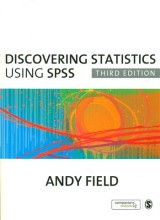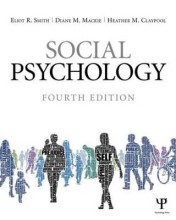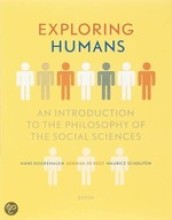Samenvatting: Pioneers Of Psychology | 9780393283549 | Raymond E Fancher, et al
- Deze + 400k samenvattingen
- Een unieke studie- en oefentool
- Nooit meer iets twee keer studeren
- Haal de cijfers waar je op hoopt
- 100% zeker alles onthouden
Lees hier de samenvatting en de meest belangrijke oefenvragen van Pioneers of Psychology | 9780393283549 | Raymond E. Fancher; Alexandra Rutherford
-
1 Foundational Ideas from Antiquity
Dit is een preview. Er zijn 81 andere flashcards beschikbaar voor hoofdstuk 1
Laat hier meer flashcards zien -
Welke unieke wijze van onderwijzen hanteerde Socrates (470 - 399 bc)?
Hij ging met zijn studenten dialogen aan waarin hij zijn studenten aanmoedigde hun eigen aangeboren kennis aan te wenden in plaats van het opleggen van ideeën. -
Waar hadden de sofisten (oa Gorgias) zich op toegelegd?
Retorica en publiek spreken
Ze waren sterke voorstanders van de democratie, en waren goed in het overtuigen van anderen. -
Welke stromingen uit de filosofie horen bij het gedachtengoed van Socrates?
- Nativisme: aangeboren kenmerken
- Rationalisme: nadruk op de ratio
- Nativisme: aangeboren kenmerken
-
Hoe verschilt het gedachtengoed van Plato van dat van Aristoteles (ca. 384 -322 b.c.)?
Plato :
wiskundige wetten regelen de kosmos- nativisme
Aristoteles :- waargenomen
ervaringen onbeschreven wastablet
-
Op welke manieren droeg Plato bij aan de wetenschap?
- Schrijven van de Socratische dialogen
- Oprichting van de Academie
- Platonisch idealisme (allegorie van de grot)
- Schrijven van de Socratische dialogen
-
Hoe verliep de carrière van Aristoteles?
- opgegroeid in de noordelijke Griekse provincies
- 17 jaar: begonnen op de Academie (bij Plato), werd een van de beste leerlingen
- 37 jaar: vertrokken uit Athene na Plato's dood
- verklaringen: teleurstelling dat hij geen opvolger werd, intellectuele meningsverschillen
- 12-jarige reis naar het noorden van Griekenland, ondertussen bezig met natuurgeschiedenis, politiek en pedagogiek
-
Waar schepte Gorgias (ca. 480 - 376 b.c.) over op?
Hij zei dat hij wie dan ook kon overtuigen over eender welk onderwerp, ook al zou hij zelf er weinig vanaf weten. -
Hoe verschilt het gedachtengoed van Plato van dat van Aristoteles?
- Plato:
- wiskundige wetten regelen de kosmos
- Aristoteles:
- waargenomen ervaringen
-
Waar was Aristoteles een groot voorstander van?
Aristoteles was de eerste wijsgeer die een voorstander was van het empirisme. -
1.1 The Greek Miracle and the Presocratic Philosophers
Dit is een preview. Er zijn 4 andere flashcards beschikbaar voor hoofdstuk 1.1
Laat hier meer flashcards zien -
De vroege Grieken hanteerde 2 belangrijke begrippen om verschillende studierichtingen aan te duiden. Welke zijn dit?
1. Logos (woord of reden) waarmee wetenschappen als geologie, geneeskunde, natuurkunde en psychologie werden aangeduid.
2. Philosophia (liefde voor wijsheid), duidend op de discussies omtrent waarheid en ultieme fundamenten van de wereld.
- Hogere cijfers + sneller leren
- Niets twee keer studeren
- 100% zeker alles onthouden
Onderwerpen gerelateerd aan Samenvatting: Pioneers Of Psychology
-
Foundational Ideas from Antiquity - The Greek Miracle and the Presocratic Philosophers
-
Foundational Ideas from Antiquity - The Life and though of Socrates
-
Foundational Ideas from Antiquity - Plato's life and Philosophy
-
Foundational Ideas from Antiquity - Aristotle and Empiricism
-
Foundational Ideas from Antiquity - An atomic footnote: Democritus, Epicurus, and Lucretius
-
Foundational Ideas from Antiquity - Three Islamic Pioneers
-
Foundational Ideas from Antiquity - Europe's Intellectual Reawakening
-
Pioneering Philosophers of Mind: Descartes, Locke and Leibniz
-
Physiologists of Mind: Brain Scientists from Gall to Penfield
-
The Sensing and Perceiving Mind: From Kant trhough the Gestalt Psychologists
-
Wundt and the Establishment of Experimental Psychology
-
The Evolving Mind: Darwin and His Psychological Legacy - Darwin's Early Life
-
The Evolving Mind: Darwin and His Psychological Legacy - The Theory of Evolution by Natural Selection
-
The Evolving Mind: Darwin and His Psychological Legacy - Darwin and Psychology
-
The Evolving Mind: Darwin and His Psychological Legacy - Darwin's Impact on Psychology and Society
-
Measuring the Mind: Galton and Individual Differences - The Anthropometric Laboratory
-
Measuring the Mind: Galton and Individual Differences - Galton's Early Life and Career
-
Measuring the Mind: Galton and Individual Differences - Darwinian Theory and Hereditary Genius
-
Measuring the Mind: Galton and Individual Differences - Nature and Nurture
-
Measuring the Mind: Galton and Individual Differences - Eugenetics
-
Measuring the Mind: Galton and Individual Differences - Galton's Influence and Continuing Controversies
-
American Pioneers: James, Hall, Calkins and Thorndike - James's Early Life
-
American Pioneers: James, Hall, Calkins and Thorndike - James's Later Career
-
American Pioneers: James, Hall, Calkins and Thorndike
-
American Pioneers: James, Hall, Calkins and Thorndike - Thorndike: Intelligence, learning and education
-
American Pioneers: James, Hall, Calkins and Thorndike - Thorndike: Intelligence, learning and education - A Puzzle Box PhD
-
Psychology as a Science of Behavior: Pavlov, Watson and Skinner
-
Social Influence and Social Psychology: From Mesmer to Milgram and Beyond
-
Mind in Conflict: Freudian Psychoanalysis and Its Successors
-
Psychology Gets Personality: Allport, Maslow and the Broadening Field
-
The Developing Mind: Binet, Piaget, and the Study of Intelligence
-
Minds, Machines and Cognitive Psychology - Pascal, Leibniz, and the origins of artificial intelligence
-
Minds, Machines and Cognitive Psychology - Babbage, Lovelace, and the analytical engine
-
Minds, Machines and Cognitive Psychology - Turing's machine and Shannon's binary switches
-
Minds, Machines and Cognitive Psychology - Computer triomphs and limitations
-
Minds, Machines and Cognitive Psychology - Miller and the study of cognition
-
Minds, Machines and Cognitive Psychology - Neisser and cognitive psychology
-
Applying Psychology: From the Witness Stand to the Workplace
-
The Art and Science of Clinical Psychology - Harrower's Journey
-
The Art and Science of Clinical Psychology - Shakow and the Scientist-Practitioner Model
-
The Art and Science of Clinical Psychology - Making Psychotherapy Scientific
-
The Art and Science of Clinical Psychology - Beck and the Development of Cognitive Therapy
-
The Art and Science of Clinical Psychology - Hathaway and the MMPI
-
Introduction: studying the history of psychology































